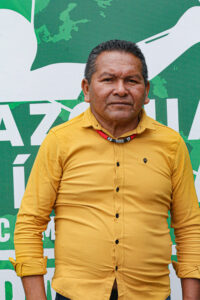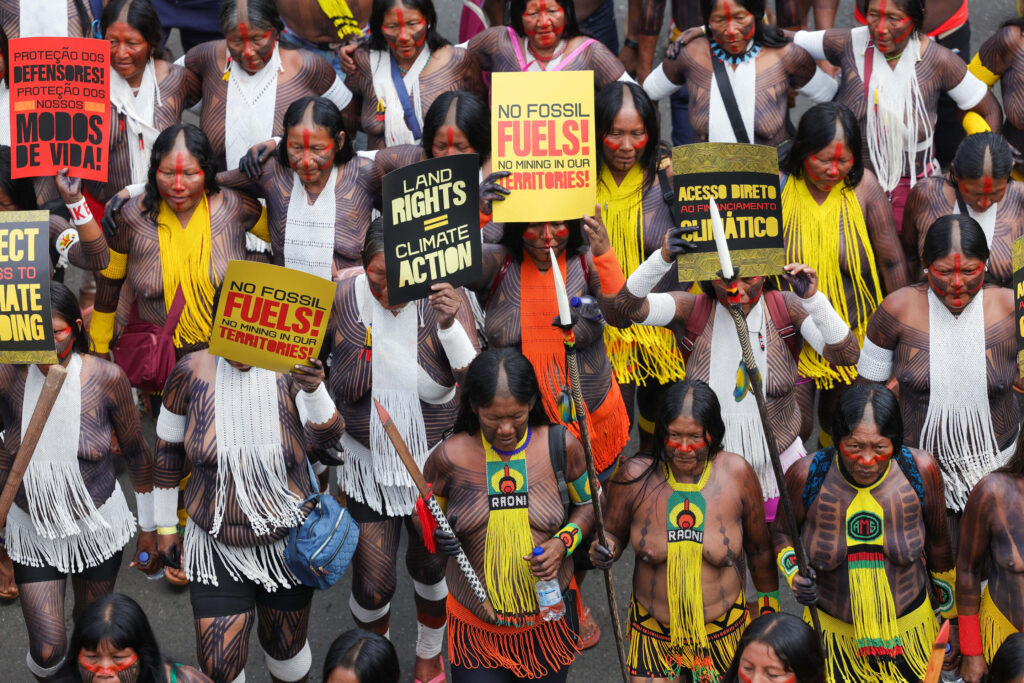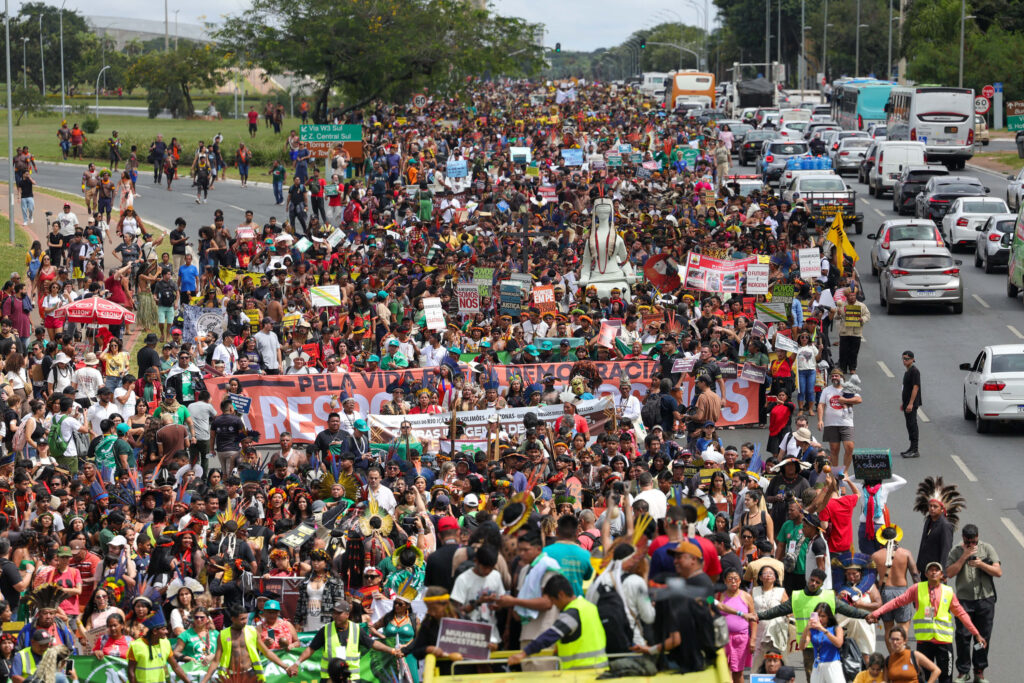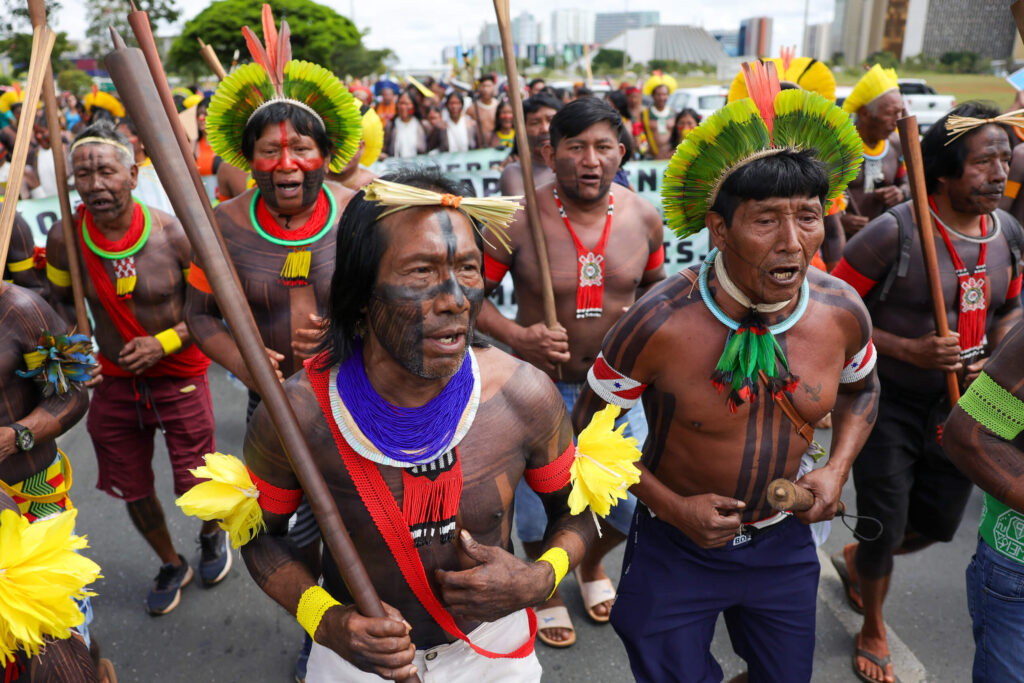São Paulo, Brazil – Hundreds of Indigenous folks from as far off as Australia gathered in Brazil’s capital, Brasília, this week to voice their calls for for territorial and human rights.
The largest mobilization of Indigenous peoples within the nation, “Acampamento Terra Livre” (Free Land Camp), drew an estimated 8,000 contributors from throughout Brazil, neighboring Amazon nations in addition to Indigenous peoples from the Pacific Islands and Australia. Members included members of no less than 135 Indigenous ethnic teams.
Organized yearly since 2004 by the Articulation of Indigenous Peoples of Brazil (APIB), the occasion has turn out to be a strong platform for Indigenous communities. This yr’s agenda centered on two most important points: the demarcation of Indigenous lands and the growth of primary companies inside their territories.
In Brazil, land demarcation is a course of to ensure land possession and unique use of its pure sources to the Indigenous peoples who reside on it. The method floor to a halt throughout the administration of Jair Bolsonaro, however has been slowly re-initiated by present President Luiz Inácio Lula da Silva.
In February, Brazil’s authorities issued a decree reinforcing the ability of the Nationwide Indian Basis (Funai), which is tasked with defending demarcated lands from land grabbers.
Indigenous folks’s function in defending the surroundings
On Monday (7), Indigenous organizations from 9 Amazon Basin nations and Oceania signed a joint manifesto emphasizing the very important function Indigenous peoples play in preserving the planet’s ecological steadiness and combating the worldwide local weather disaster.
“We, united by the ancestral power of the Earth, by the knowledge that sustains life, and by the relentless battle for a livable future, concern this declaration as an pressing moral name: the local weather disaster doesn’t wait, and governments are failing to behave within the face of humanity’s biggest menace,” the document learn.
“Our cultures and historical information make us guardians of the lands and seas that regulate the planet’s equilibrium. The Amazon rainforest and the Pacific Ocean are linked by the identical urgency: to guard what’s most treasured — life itself.”

Sergio Marworno, vice-coordinator of the Coordination of the Indigenous Organizations of the Brazilian Amazon (COIAB) and a outstanding Indigenous chief from the state of Amapá, instructed Brazil Reviews in regards to the important function that Indigenous communities play in mitigating local weather change.
“Indigenous territories act as limitations in opposition to the impacts of local weather change,” he stated. “Their preserved forests function main carbon sinks. The forest stands due to us — Indigenous peoples who handle and defend the biome. We even have the Territorial and Environmental Administration Plans (PGTAs), which information land use and assist combat local weather change from inside our communities,” he stated.
Visits from overseas dignitaries
All through the week in Brasília, Indigenous teams led marches, participated in public boards and roundtable discussions, and attended a ceremonial session on the Nationwide Congress.
International diplomats additionally visited the Free Land Camp encampment, together with Norway’s ambassador to Brazil, Odd Magne Ruud.
The ambassador signed a cooperation settlement with the Xingu Indigenous Land Affiliation to help sustainable growth initiatives and assist counter local weather threats within the area.



(Picture credit Fabio Rodrigues-Pozzebom through Agência Brasil)
France’s embassy used the event to announce a €1 million (roughly $1.12 million USD) donation to 3 Indigenous organizations: the Raoni Institute, the Aritana Institute, and the Xingu Indigenous Land Affiliation. The funds will help territorial safety efforts, revenue technology by bioeconomy initiatives, and institutional strengthening. The organizations will handle the sources and be accountable for designing and implementing the initiatives.
The bulletins come simply months after the Trump administration cut USAID funding which may influence conservation efforts. Final yr, the company despatched over $22 million to Brazil, $14 million of which was earmarked for conservation within the Amazon.
In line with Marworno, the mobilization within the nation’s capital is a key second to amplify Indigenous voices and put stress on the federal authorities to behave.
“The federal government should reinforce the establishments and packages accountable for defending Indigenous lands, corresponding to Funai and PNGATI [the National Policy for Territorial and Environmental Management of Indigenous Lands],” he stated.
“We’d like better funding and dedication to deal with the pressing wants of our communities and safeguard all Indigenous territories throughout the Amazon.”
Featured Picture: Indigenous folks on the Free Land Camp in Brasilia (Picture credit score Fabio Rodrigues-Pozzebom through Agência Brasil)
